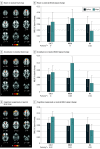Evaluation of Cognitive Behavioral Therapy vs Mindfulness Meditation in Brain Changes During Reappraisal and Acceptance Among Patients With Social Anxiety Disorder: A Randomized Clinical Trial
- PMID: 34287622
- PMCID: PMC8295897
- DOI: 10.1001/jamapsychiatry.2021.1862
Evaluation of Cognitive Behavioral Therapy vs Mindfulness Meditation in Brain Changes During Reappraisal and Acceptance Among Patients With Social Anxiety Disorder: A Randomized Clinical Trial
Abstract
Importance: Cognitive behavioral group therapy (CBGT) and mindfulness-based stress reduction (MBSR) are thought to help patients with social anxiety disorder (SAD) via distinct emotion-regulation mechanisms. However, no study has compared the effects of CBGT and MBSR on brain and negative emotion indicators of cognitive reappraisal and acceptance in patients with SAD.
Objective: To investigate the effects of CBGT and MBSR on reappraisal and acceptance in patients with SAD and to test whether treatment-associated brain changes are associated with social anxiety symptoms 1 year posttreatment.
Design, setting, and participants: In this randomized clinical trial, a total of 108 unmedicated adults diagnosed with generalized SAD were randomly assigned to 12 weeks of CBGT, MBSR, or waitlist. The final sample included 31 patients receiving CBGT, 32 patients receiving MBSR, and 32 waitlist patients. Data were collected at the psychology department at Stanford University from September 2012 to December 2014. Data were analyzed from February 2019 to December 2020.
Interventions: CBGT and MBSR.
Main outcomes and measures: Changes in self-reported negative emotion and functional magnetic resonance imaging (fMRI) blood oxygen level-dependent (BOLD) signal within an a priori-defined brain search region mask derived from a meta-analysis of cognitive reappraisal and attention regulation 1 year posttreatment.
Results: Of 108 participants, 60 (56%) were female. The mean (SD) age was 32.7 (8.0) years. Self-reported race and ethnicity data were collected to inform the generalizability of the study to the wider population and to satisfy the requirements of the National Institutes of Health. From the categories provided by the National Institutes of Health, 47 participants selected White (43.5%), 42 selected Asian (38.9%) 10 selected Latinx (9.3%), 1 selected Black (1%), 1 selected Native American (1%), and 7 selected more than 1 race (6.5%). CBGT and MBSR were associated with a significant decrease in negative emotion (partial η2 range, 0.38 to 0.53) with no significant between-group differences when reacting (β, -0.04; SE, 0.09; 95% CI, -0.11 to 0.08; t92 = -0.37; P = .71), reappraising (β, -0.15; SE, 0.09; 95% CI, -0.32 to 0.03; t92 = -1.67; P = .10), or accepting (β, -0.05; SE, 0.08; 95% CI, -0.20 to 0.11; t92 = -0.59; P = .56). There was a significant increase in BOLD percentage signal change in cognitive and attention-regulation regions when reappraising (CBGT = 0.031; MBSR = 0.037) and accepting (CBGT = 0.012; MBSR = 0.077) negative self-beliefs. CBGT and MBSR did not differ in decreased negative emotion and increased reappraisal and acceptance BOLD responses. Reappraisal-associated MBSR (vs CBGT) negative emotions and CBGT (vs MBSR) brain responses were associated with social anxiety symptoms 1 year posttreatment.
Conclusions and relevance: The results of this study suggest that CBGT and MBSR may be effective treatments with long-term benefits for patients with SAD that recruit cognitive and attention-regulation brain networks. Despite contrasting models of therapeutic change, CBT and MBSR may both enhance reappraisal and acceptance emotion regulation strategies.
Trial registration: ClinicalTrials.gov Identifier: NCT02036658.
Conflict of interest statement
Figures


References
-
- Acarturk C, de Graaf R, van Straten A, Have MT, Cuijpers P. Social phobia and number of social fears, and their association with comorbidity, health-related quality of life and help seeking: a population-based study. Soc Psychiatry Psychiatr Epidemiol. 2008;43(4):273-279. doi:10.1007/s00127-008-0309-1 - DOI - PubMed
-
- Alonso J, Angermeyer MC, Bernert S, et al. ; ESEMeD/MHEDEA 2000 Investigators, European Study of the Epidemiology of Mental Disorders (ESEMeD) Project . Disability and quality of life impact of mental disorders in Europe: results from the European Study of the Epidemiology of Mental Disorders (ESEMeD) project. Acta Psychiatr Scand Suppl. 2004;(420):38-46. doi:10.1111/j.1600-0047.2004.00329.x - DOI - PubMed
Publication types
MeSH terms
Associated data
Grants and funding
LinkOut - more resources
Full Text Sources
Medical

